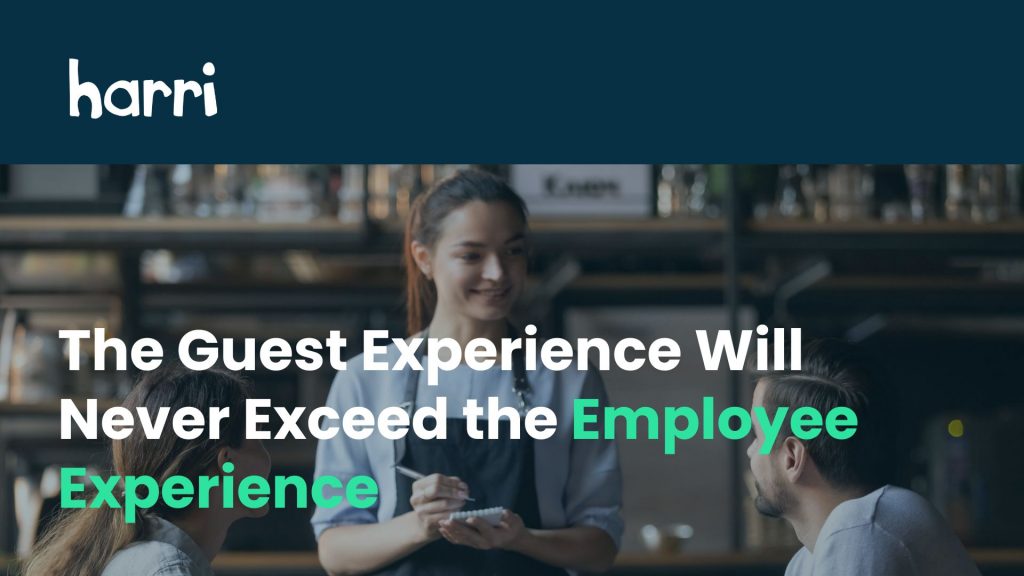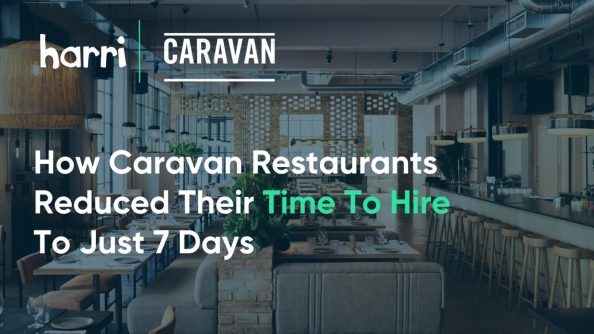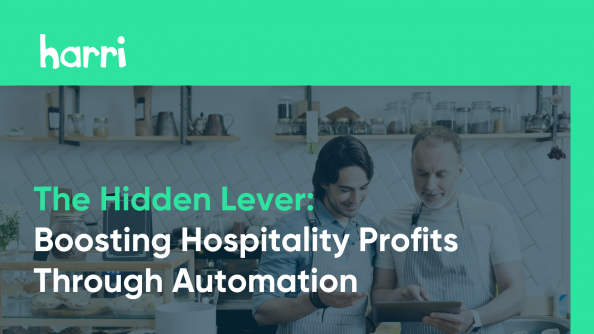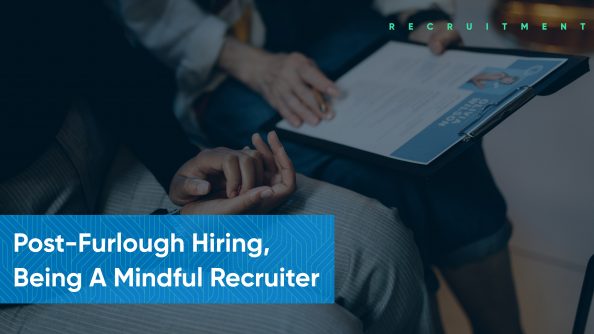The Link Between Employee Engagement and Guest Satisfaction in Hospitality

- By Harri Insider Team | March 20, 2023
Unhappy employees in hospitality can ruin the guest experience. For business owners and operators, an important guiding principle to know is that “your guest experience will never exceed your employee experience.” In short, this means that your guests are only going to be as happy as your workers are. If your team is not engaged, that dissatisfaction with their job is eventually going to be evident to customers.
Studies prove that happy employees are more engaged. They work faster, work harder and their attitude is more positive. Unhappy employees don’t feel invested in their job and won’t go the extra mile for a guest; they may not even do the minimum, leaving customers in the lurch and affecting your bottom line.
Unhappy employees are more likely to be late to work, not show up at all, and make mistakes. In the hospitality field, guests have expectations for clean hotel rooms, food served promptly without missing utensils or condiments, and to be quickly served at counters. The experiences that guests and customers have are directly related to the engagement of each individual employee as well as the team together. The good news is that a solid strategy that keeps your workers engaged can have a direct, positive impact on guest satisfaction.
Customer Experience and Employee Engagement
Employee engagement measures how invested employees are in their roles and their contribution to company success. When an employee is engaged, they’ll show up every day, arrive on time and do their best work without being prodded. This results in a more positive customer experience, because guests have their needs met without wasted time, and managers can focus on bigger problems, or be available to engage with guests directly, instead of trying to motivate someone to do their job.
In the hospitality industry, guests or customers are there for the experience, instead of a product. They’ve potentially spent a lot of money to have an enjoyable vacation, and one employee who is not engaged can be detrimental. Employees that work in a field with high demand and seasonally trending tasks need to be fully dedicated, because employee engagement and customer experience go together.
Engaged employees are more likely to take initiative and work independently, requiring less oversight. They understand what it is they are supposed to be doing, and they do it with a higher level of accuracy. These workers are happier on the job overall, and they feel heard, seen and valued, which translates to faster and more reliable task completion. Engaged employees greet guests with smiles and avoid negative conversations, enhancing the guest experience.

The Benefits of Employee Engagement in the Hospitality Industry
Investing in employee engagement strategies can significantly enhance your company’s success.
The benefits of employee engagement include higher retention rates, reduced turnover, increased productivity, and happier guest experiences. This means guests are more likely to return for another visit, and they’ll become brand evangelists, sharing their experiences with others. It’s easier to set clear expectations and provide incentives than to fix a negative reputation caused by unfavorable reviews.
Brand loyalty is crucial in the competitive hospitality industry. Rising above the rest ensures business longevity, and it takes daily commitment from everyone involved. Engaged employees who go above and beyond for guests can significantly boost business, especially in a social media-centric world.
Improving Employee Engagement Alongside Guest Satisfaction
Increasing guest satisfaction is a two-for-one achievement. The goal of any business owner should be profit, but not at the expense of your employees. Employees need to feel devoted to their job and have their own needs met first. Once that happens, their feelings spread to the guests without any extra effort. In short, guest satisfaction starts from engaged employees.
Here are a few ways you can engage your employees that will have the greatest impact on your customer experience.
Meet Your Teams Where They Are
Harri Engage connects with your employees where they already live and work for more effective engagement strategies by asking quick questions – for example, how do you feel about your job right now? – when employees clock in you will get a 100% response rate. Harri Engage also allows you to provide extra support to new starters in those critical first 90 days, with an engagement strategy delivered relative to their start date.
Compensation and Benefits
Compensation and benefits are why most employees come to work in the first place. Making sure they are competitive and attractive will encourage employees to not only stay on the job but to tell others about their positive employment experience. This helps increase brand reputation while also building your future potential talent pool when you need to hire more people.
Hire people at a fair rate and adjust along the way to increase pay as time goes on. Adding supplemental paid time off (PTO) to reward employees for staying at your company is an additional way to incentivize and reward dedication. Guests like to know a company is doing right by its team.
Perks
Some companies have had great success with adding programs as part of a hiring package, such as company gym access/membership, free life insurance, or a wellness program. In today’s stressful world, providing employees with a hotline to call if they’re experiencing a mental health crisis can be incredibly helpful, but also pays you back with a workforce who feels cared for outside of their job tasks.
Flexible Scheduling or Remote Work
Hourly employees are very common in the hospitality industry, which means scheduling can be challenging. Using tools like the Harri scheduling tool can alleviate some pressure by ensuring everyone gets the hours they need when they need them.
Some of your employees may be college students, people working a second job or those who just wish to keep one foot in the workforce but don’t want to work full-time. Managing diverse scheduling needs can be complex, but developing flexible patterns can prevent unhappiness. Every employee knows their job needs to be prioritized, but there is a balance you can achieve when it comes to optimizing scheduling for your team.
Flexible scheduling can mean a lot of things, but it may mean rotating weekends, giving someone a four-day work week, or allowing them to work remotely if their tasks allow it. Some employees may wish to work weekends, while others cannot, and using a software that allows them to input that information can streamline the process. Don’t let time and attendance issues get out of control by taking preemptive action.
Showing employees that you value them as people, not just workers, pays off for everyone involved. Scheduling satisfaction is also a top factor in employee retention and Harri’s intelligent scheduling software can help manage shift coverage, monitor overtime, and allow employees to handle shift swaps or change requests independently.
Recognition
Everyone likes to feel valued, and simple praise can go a long way. Shoutouts in team meetings, an employee recognition board, and acknowledging birthdays personalize an employee’s experience without affecting the budget.
Rewarding your staff for going above and beyond, such as when a guest provides positive feedback for a worker’s role in their experience is another easy way. Rewards can be tangible, such as a free day off, a gift card, a bonus, or other low-cost items to encourage employees to go the extra mile. Promote from within, which encourages people to work towards goals, and if you know of people who are interested in moving up, help them develop a career path at your company.
If you’re looking to upgrade your team communications, Harri offers a dedicated mobile app for managers to centralize messaging, announcements, and updates.
Education or Personal Growth
If you ask around, you’ll undoubtedly find that you have a wealth of potential future leaders on your team, but they lack a specific skill or the education needed to make the leap to management. Offering tuition assistance, or a schedule that allows them to attend classes, tells your employees you understand their desires to further their career. Personal growth isn’t just a buzzword; it should be an employee goal.
Acknowledging that your employees want to be able to better their income earning and have a solid career path will increase their engagement. Don’t forget training! Employees who aren’t adequately trained for their roles won’t meet goals and will feel unprepared.
Company Culture
We’ve all had that one job where we feel bullied by a colleague, or singled out for needing a different schedule, or where management separates themselves, creating division. A toxic workplace that overworks its employees or encourages them to report one another is harmful to everyone.
Other problematic company cultures develop where there is preferential treatment, favoritism, or retaliation for speaking up. It’s not easy to oversee all these possibilities, but by monitoring employee data and creating an open-door policy, you can help mitigate problems and resolve them for not just those involved now but future employees. Ensure your company has visible core values and a mission statement. Upholding these values prevents your business from becoming a toxic environment.
Inclusion and Diversity
Creating a space where everyone feels welcome, safe, and included is vital for every business today. This means hiring practices need to be diverse, increasing your reach of prospective candidates, and when you hire people outside of your norm, make sure they feel as valued and important as everyone else. If you have fun employee events, ensure that everyone has access to them at some point to prevent resentment.
How to Measure Employee Engagement
Effectively measuring employee engagement requires strategic data collection. Data collection is key here. It will help you spot red flags, such as a high turnover rate, before they are irreparable. You’ll be able to track each employee individually, so you can pinpoint when a problem started with a specific worker; this allows you to approach a problem before someone quits or creates an issue with a guest. Plus, you’ll be able to communicate and see if there’s a resolution on your end. Retaining an employee is always cheaper than hiring a new one, and you’ll often end up with a more dedicated employee.
Asking for feedback is another effective method, and anonymous input can help you identify gaps or brewing problems. This helps you to make proactive change, and it also tells your employees that you care about what they say, think and feel.
Harri’s communication and feedback features, which gather employee sentiment and keep managers informed of frontline issues, are game-changers.
Developing KPIs and comparing data week over week is also best practice. You will be able to recognize top performers as well as staff that are overly scheduled or not meeting goals. You can also compare historical data including guest status, complaints, or employee problems to see if any patterns have developed.
Consider holding exit interviews if you don’t already. Encourage honesty and candor. This requires a thick skin, because you may not like everything you hear, but you can learn from it. Employees who already have other jobs can feel more able to tell you things they couldn’t when still under your employ, and you may gain valuable knowledge about circumstances that may help you prevent others from leaving.
Listen to guest feedback and solicit it whenever possible. Some guests will share illuminating details that can factor into them returning or writing a negative online review that thousands will see. Take any necessary action.

Rethinking Employee Engagement and the Guest Experience with Harri
Harri is an all-in-one platform offering solutions for hospitality businesses that will make you wish you had started using it sooner Track staff scheduling and sales performance, share announcements, and utilize custom messaging options to allow employees 24/7 access from anywhere. Retain documentation, share information with appropriate teams, and act in a much easier and more timely fashion. Meet your employees where they are, and they will thank you for it.
Employee engagement strategies may take some time to develop, but dedicate a team to their implementation. Oversee it, use the data you’re collecting, and consider AI or online tools to constantly improve the customer experience and employee engagement.
Contact us for a free demo so you can get started today!





















